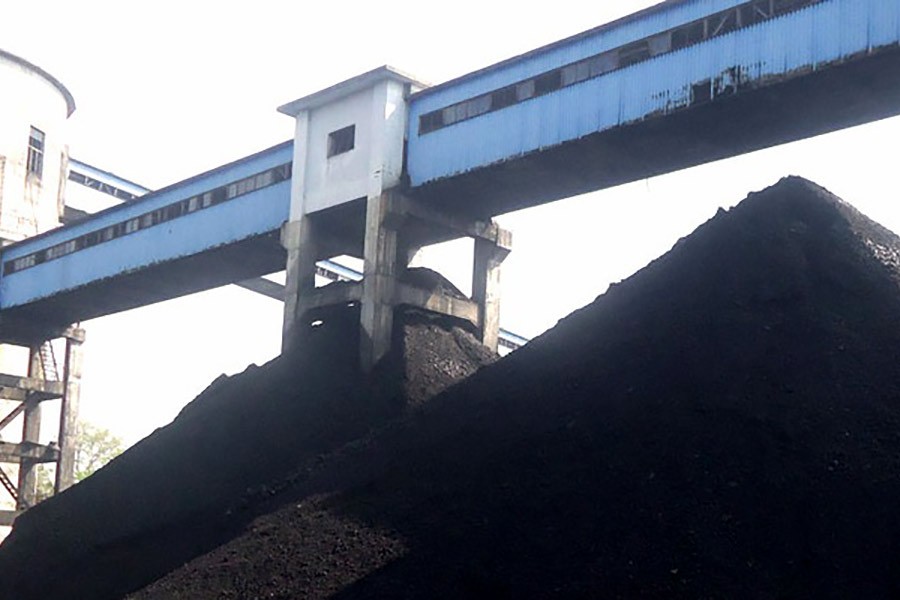
Published :
Updated :

The challenging task of importing good quality (i.e., high calorie, low ash, low moisture and low sulfur) coal from international market to feed Barapukuria coal-fired power plant in Dinajpur has started. The plant with its three units has a cumulative installed capacity of producing 525 megawatt (MW) power. The first two units (2 x 125 MW) started its commercial operation in 2015 while the third unit (1 x 275 MW) started its operations later. The power plant is designed exclusively to use coal of 'Barapukuria grade' (high calorie, low sulfur and low ash coal). If run in full capacity, it should require 5,200 tonnes of coal daily.
The Barapukuria coal mine is the only source of supply for the coal mine mouth power plant (the only coal-fired thermal power plant in the country so far). The underground Barapukuria coal mine is designed to produce one million tonnes of coal annually (less than 3,500 tonnes a day on an average). The initial mine development plan included 250 MW power plant feed (70 per cent of the mine's target productions) and the remaining bulk of coal was planned to be supplied (nearly one-third of its productions) to local consumers (like the brick manufacturers). But with the inclusion of the third unit (275 MW) at the Barapukuria power plant a few months back, selling coal to the local market has become impossible (assuming that the power plant will consume more than it was required for the total daily productions). However, coal sale continued from the mine yard and at one point the yard became empty. This happened coincidentally when the mine temporarily had to shut its productions due to technical reasons and the Barapukuria thermal power plant desperately required to continue its power generation to meet the increased power demand in the northern region.
The published reports suggest that the Barapukuria coal mine produced approximately 1,01,66,000 tonnes of coal between 2005 and June 29 this year. Of the produced volume, 66,87,000 tonnes were supplied to the mine mouth power plant for generating power. Besides, 33,19,000 tonnes of coal were sold to different organisations and brick kilns. The mine authorities took another 12,000 tonnes for their own use.
So, there should have been a stock of 148,000 tonnes of coal at the 17-acre mine yard. But it was found in the mid July that the mine yard has only 3,000 tonnes of coal stock. It was further reported that no inventory audit for coal production and selling was done since the Barapukuria coal mine commenced its operations back in 2005. The technical system loss, if any, was not recorded. The Barapukuria power plant had to be shut down on July 22 due to unavailability or no supply of coal. Electricity supply in the country's northern region was severely hampered as the power plant was shut down. The government later initiated investigations into the mismanagement.
Steps have been taken to resume coal mine productions but production arrangements underground will not be ready until mid-September. Accompanied with all the textbook mining challenges, the underground Barapukuria coal mine has suffered from production interruptions on several occasions. Apart from technical limitations, the mine suffered a few months back from a non-stop labour strikes for a few weeks. It is, therefore, obvious that from the single source of Barapukuria mine, coal supply to the power plant at the mine mouth could face challenges.
Despite that common knowledge, Barapukuria coal power plant installed its third unit without having alternative coal supply chain. The three power plant units, if run uninterrupted, are destined to face coal supply interruptions as the mine productions and the power plant fuel demands thoroughly mismatch. Hence, the shortfall has to be met by imports. It was simply obvious, but Barapukuria coal-fired thermal power plant authority did not arrange any alternative source of coal supply.
Under the circumstances, Bangladesh Power Development Board (BPDB) floated tenders for purchasing 100,000 tonnes of coal from international market for the Barapukuria coal-fired thermal power plant in mid-August. The interested bidders are expected to respond and submit their bids within August for supplying coal under certain conditions at the power plant site. BPDB expects that the tender evaluation, contract negotiations and 100,000 tonnes of coal supply activities should be completed within December this year.
Supplying coal from the international market to Barapukuria power plant site is, however, a challenging task. None of the country's ports are ready to handle a large volume of coal import. There is no river route and rail link that can allow easy transportation of coal from the country's sea ports. Several transshipments of coal is inevitable involving coal loss, high transportation and handling cost to transport coal even inside the country. It is also challenging to accomplish coal transportation activities maintaining a very tight schedule. All these factors will make the imported coal significantly expensive compared to the cost of coal from the mine supply. BPDB is now faced with the challenge of importing as well as supplying coal to the Barapukuria power plant at a reasonable price.
Mushfiqur Rahman, a mining engineer, writes on energy and environmental issues.


 For all latest news, follow The Financial Express Google News channel.
For all latest news, follow The Financial Express Google News channel.